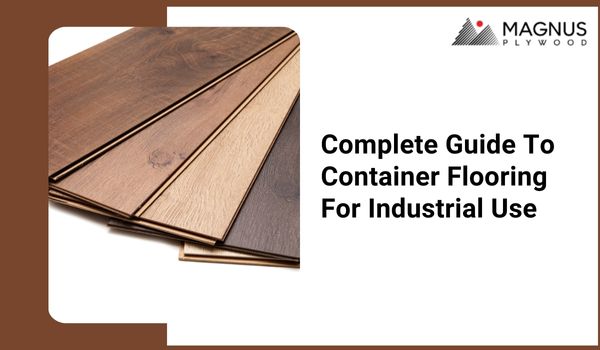When it comes to choosing material for heavy-duty applications, chequered plywood stands out. Designed with rugged texture, non-slip grip with the highest load-bearing capacity, this is one of the best plywood for flooring.
However, if you are planning to add a durable base material to your commercial vehicles or are looking for high-quality plywood engineered flooring for industrial spaces, understanding the sizes, thickness, and density of this transport plywood is inevitable.
This ensures that whether you pick bus flooring plywood, or container flooring, it perfectly matches your specific needs.
Today, in this blog, we are here to highlight different thicknesses, sizes and densities you can explore in chequered plywood.
In addition, we will also be sharing some of the key factors that will help you pick the ideal transport plywood. So, without ado, let us quickly jump into this guide and make a smart decision for your next project now!
Different Thickness of Chequered Plywood
When it comes to selecting a chequered plywood, the thickness of the plywood plays a major role. It determines its durability and weight-bearing capacity. Depending on different types of usage, below we have mentioned the standard options you can explore in chequered plywood:
1. 12 mm Thickness: This plywood thickness is best for light-duty applications or secondary base layers.
2. 15 mm Thickness: This thickness is a popular choice for bus flooring plywood, and other light commercial vehicles.
3. 19 mm Thickness: This plywood thickness is suitable for medium to heavy-duty uses such as container flooring and industrial ramps.
4. 25 mm Thickness: It is ideal for high-impact, high-traffic areas, such as trailers or heavy equipment platforms.
Different Sizes in Chequered Plywood
Chequered plywood comes in a wide range of sizes that suit various flooring applications, be it your compact vehicle flooring or large industrial platforms. Here are the available size options in chequered plywood, along with where they can be used:
1. 5.5 x 2.5 feet: This plywood size is best for compact flooring needs in small commercial vehicles or utility carts.
2. 6 x 3 feet: This size is ideal for mini buses or narrow aisle flooring where space is limited.
3. 7 x 3 feet: This size is great for small goods carriers and intermediate flooring applications.
4. 8 x 4 feet: This size is a versatile choice for standard flooring in transport vehicles and industrial platforms.
5. 8 x 5 feet: This plywood size is suitable for wider vehicle floors or areas requiring broader coverage with fewer joints.
6. 9 x 5 feet: This is perfect for medium to large trucks or container flooring with higher load areas.
7. 10.5 x 5.5 feet: This plywood size is best for heavy-duty flooring in trailers, containers, or industrial trolleys where maximum coverage and strength are essential.
Understanding the Density of Chequered Plywood
When selecting chequered plywood for heavy-duty applications like bus flooring, container flooring, or transport plywood, understanding the density is just as important as knowing the size and thickness. Here is the ideal density range for chequered plywood:
1. 0.845 – 0.95 gm/cm³: This density is the standard one. It offers reliable strength, making it ideal for general transport applications, be it light or medium loads.
2. 0.95 – 1.10 gm/cm³: This density falls under the high-strength range. It is ideal for plywood engineered flooring in commercial vehicles or warehouses.
3. 1.10 – 1.20 gm/cm³: This density is ideal for projects that demand extra heavy-duty. It is best suited for industrial setups, container flooring, or trailers carrying extremely heavy cargo.
That’s a wrap! This was all about different thicknesses, sizes, and density ranges available in chequered plywood. There are several options, each ensuring strength, durability, and suitability for various light or heavy-duty applications.
Now, let us take a look at some of the key factors to consider while choosing the right thickness, size, and density of transport plywood that best fits your project requirements.
Key Factors to Consider While Choosing the Right Chequered Plywood
Whether you are looking for on-bus flooring plywood, container flooring, or plywood engineered flooring, here are five essential factors that will help you make the right decision:
1. Load-Bearing Requirement
The first factor to consider for buying the best plywood for flooring is to understand the weight load your plywood can handle. If you are flooring a mini utility vehicle or a small cart, thinner plywood, like 12 mm or 15 mm, can be sufficient.
But for trailers, containers, or heavy industrial equipment, go for 19 mm or 25 mm thickness with high density, which can withstand heavier loads without bending or warping.
2. Application Type & Environment
The next factor to consider while choosing the best bus flooring plywood or container flooring, is where and how it will be used. For indoor industrial use, a medium-density board is the right choice.
But in outdoor or high-moisture environments like transport vehicles, you would need high-density chequered plywood with better surface; this will resist water, wear, and impact over time.
3. Surface Grip & Anti-Skid Requirement
Another essential factor while choosing the right plywood engineered flooring is to check whether it has a textured and anti-slip surface.
For flooring that experiences foot traffic, rolling equipment, or machinery movement, always check the quality of the surface grip. A strong, rugged texture will not only ensure safety but also help the flooring last longer under pressure.
4. Size Suitability for Your Vehicle or Platform
The fourth factor to consider while picking the best plywood for flooring is to ensure that the size perfectly fits your vehicle or platform. This is important because it reduces wastage and the number of joints.
For example, chequered plywood, which is 10.5 x 5.5 feet, is great for wide trailers or platforms, while smaller sizes like 5.5 x 2.5 feet are perfect for compact spaces. Hence, before deciding on anything, always measure your flooring area and select a size that offers the best fit with minimal cutting.
5. Density for Long-Term Performance
The final factor to consider for picking the best plywood for flooring is to check its density. For instance, plywood engineered flooring that has a higher density range between 0.95 – 1.20 g/cm³ offers better compression strength and durability, making it ideal for heavy-duty use cases.
However, if your vehicle, be it a bus or truck, involves regular movement, heavy loads, or vibration, consider investing in a high-density board. This will ensure a longer lifespan and lower maintenance costs over time.
Final Words
Choosing the right chequered plywood is not just about picking a board; it is about ensuring your flooring can handle pressure, weight, and time.
By understanding the available thickness options, size variations, and density ranges, you can ensure you are making a smart investment for your transport plywood, bus flooring, or container flooring needs.
Moreover, considering factors such as load requirements, usage environment, surface grip, and space dimensions will help you book the best plywood for flooring that offers the perfect blend of durability, performance, and safety.
Are you ready to choose the best plywood for your next flooring project? Connect with our team today to explore the most reliable and high-quality chequered plywood solutions tailored to your needs!
FAQs
1. How do I choose the right thickness of chequered plywood for flooring?
Ans. There are different thicknesses of plywood available for flooring. Though there are many thicknesses, learning the load requirements before selecting plywood for flooring is essential.
For instance, if you are planning to carry light cargo, you can consider plywood of 12 mm or 15 mm thickness. For carrying heavy loads, consider plywood of 19 mm or 25 mm thickness.
2. Which size of chequered plywood is best for truck or bus flooring?
Ans. Selecting the ideal size for flooring in buses or trucks is inevitable. Some of the most popular sizing that fits every flooring project’s requirements include 9 x 5 feet or 10.5 x 5.5 feet.
These sizes of chequered plywood will not only offer broader coverage, but also reduce the number of joints. This, as a result, provides a smoother and more durable base for your flooring, offering long-term performance.
3. What are the available thickness options in chequered plywood?
Ans. The available thickness options in chequered plywood include 12 mm, 15 mm, 19 mm, and 25 mm. Each thickness of plywood fits a range of projects, be it carrying lightweight cargoes, heavy-duty industrial applications.
4. Is 8×4 the standard size for chequered plywood?
Ans. Yes, 8×4 is the standard size for chequered plywood. This size of plywood engineered flooring is suitable for a variety of projects, be it your flooring in transport vehicles or industrial platforms. Conversely, other sizes like 6 x 3, 8 x 5, and 10.5 x 5.5 feet are ideal depending on specific project needs.
5. How does density affect the performance of chequered plywood?
Ans. Density directly impacts the strength, durability, and load capacity of chequered plywood. For instance, higher-density plywood ranging between 0.95 to 1.20 g/cm³ offers better compression resistance, making it ideal for bus flooring, container flooring, and other heavy-duty applications. It also ensures longer lifespan and better performance under stress, vibration, and weight.




